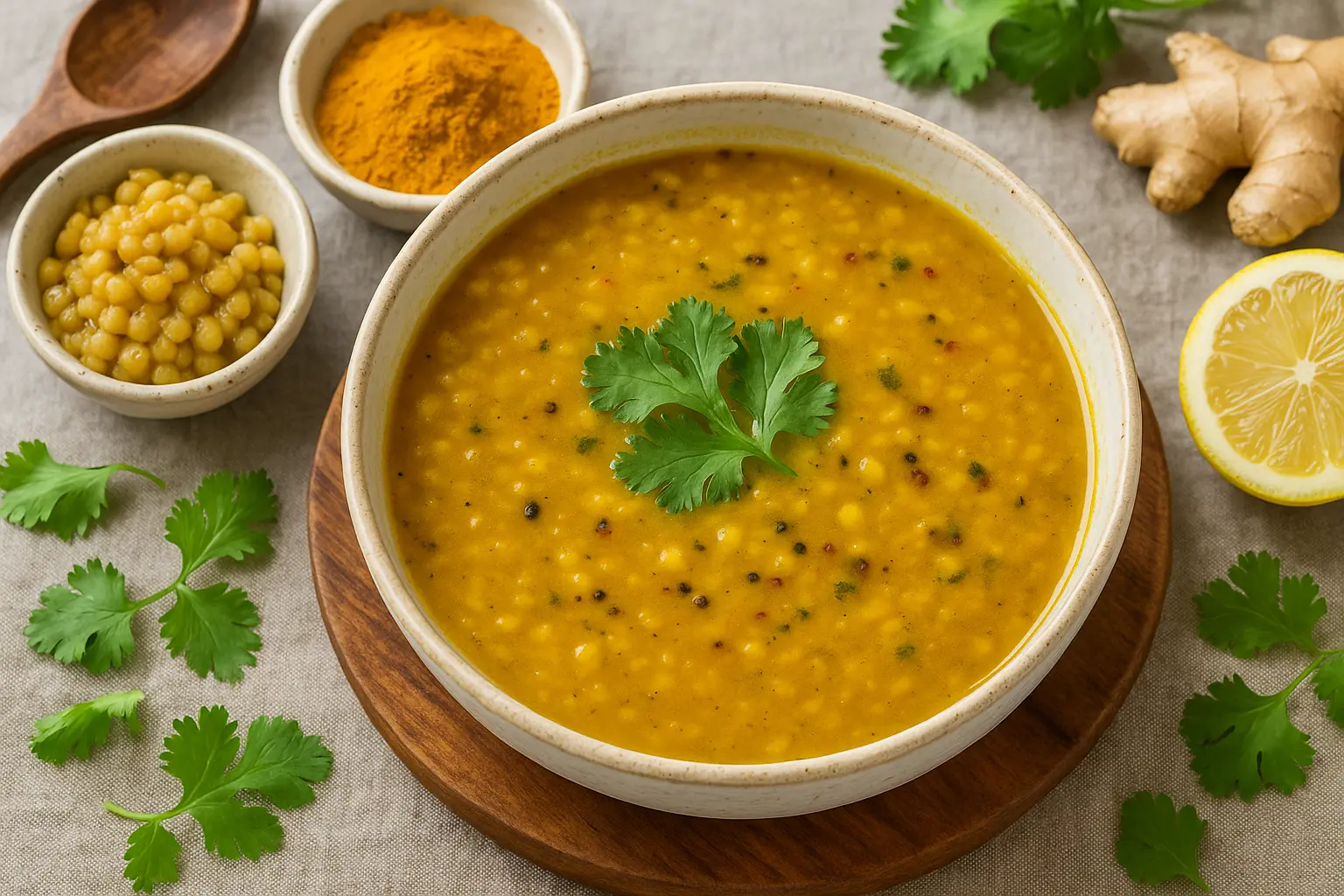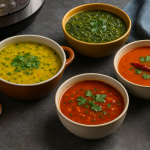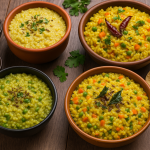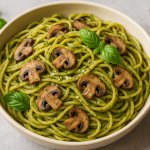Ayurveda, India’s ancient science of life and wellness, has guided generations on how to eat, live, and heal in harmony with nature. Central to this philosophy is the belief that “agni,” or digestive fire, governs overall health. If agni is strong, food is properly digested, nutrients are absorbed, and toxins (ama) are minimized. Weak digestion, on the other hand, can lead to sluggishness, bloating, acidity, and chronic imbalances.
Soups, in Ayurveda, are more than comfort food—they are medicinal. Warm, easily digestible, and infused with spices that stoke digestive fire, Ayurvedic soups help reset the gut and nourish the body. Whether you are looking for a gentle meal after a heavy day, a way to soothe seasonal imbalances, or a daily practice of mindful eating, these soups bring balance back to your plate.
This article explores Ayurvedic principles of digestion, the role of soups in balancing doshas, and recipes that highlight healing herbs and seasonal produce. By the end, you’ll have practical guidance and recipes to integrate Ayurvedic soups into your routine.
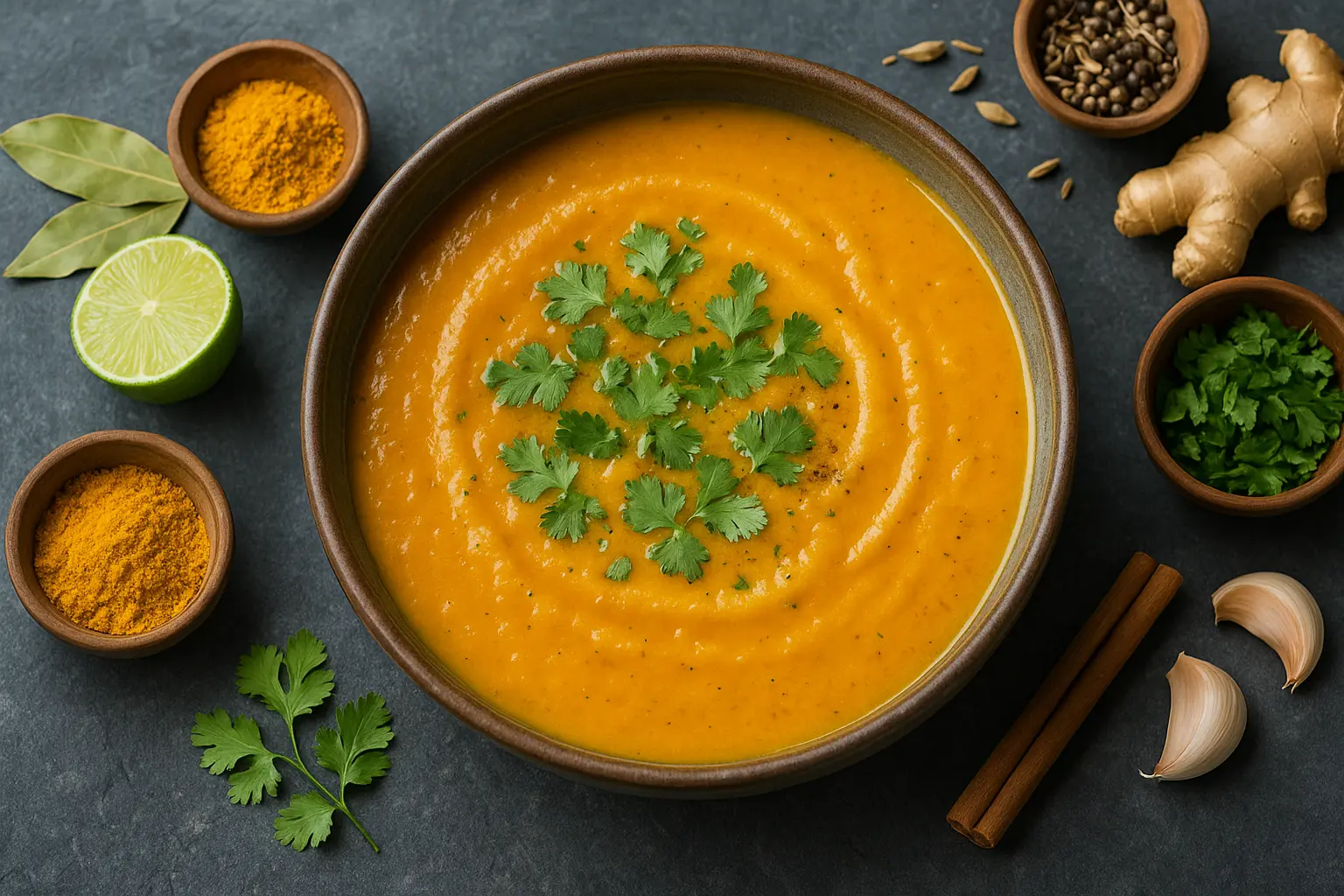
Part 1: Understanding Digestion in Ayurveda
1.1 The Role of Agni
In Ayurveda, agni is not just the literal digestive flame but the symbolic fire of transformation. It governs metabolism, assimilation, and energy production. When agni is weak:
Food is not fully digested.
Ama (toxins) accumulate.
Fatigue, constipation, or indigestion appear.
Soups, especially when warm and spiced, gently ignite agni, making them a cornerstone for anyone with sluggish digestion.
1.2 The Influence of Doshas
Each person has a unique constitution—vata, pitta, or kapha—that determines how food is processed. Soups can be tailored for each:
Vata: Warm, grounding, oily soups balance dryness and irregular digestion.
Pitta: Cooling, soothing soups calm excess heat and acidity.
Kapha: Light, spicy, detoxifying soups counter heaviness and sluggish digestion.
1.3 The Power of Warm Liquids
Ayurveda emphasizes warm, cooked foods over raw salads, especially for those with digestive issues. Soups provide hydration, nourishment, and heat, easing the work of agni and reducing strain on the gut.
Part 2: Core Principles of Ayurvedic Soups
2.1 Key Spices for Digestion
Spices are medicine in Ayurveda. Common digestive enhancers include:
Cumin – reduces gas, enhances nutrient absorption.
Fennel – cools acidity, supports gut motility.
Ginger – stimulates agni, relieves nausea.
Turmeric – reduces inflammation, supports liver health.
Black Pepper – enhances bioavailability of nutrients.
2.2 Balance of the Six Tastes
Every Ayurvedic meal should include six tastes: sweet, sour, salty, bitter, pungent, and astringent. Soups can be crafted to achieve this balance, creating satisfaction and reducing cravings.
2.3 Seasonal Alignment
Eating with the seasons strengthens immunity and digestion:
Winter: Warming soups with root vegetables and ginger.
Summer: Cooling soups with zucchini, mint, and fennel.
Monsoon: Light soups with digestive spices like pepper and cumin.
Part 3: Ayurvedic Soup Recipes for Digestive Health
3.1 Classic Moong Dal Soup
A staple in Ayurvedic cooking, moong dal (split mung beans) is light, easy to digest, and detoxifying.
Ingredients:
½ cup yellow moong dal
1 tsp ghee
½ tsp cumin seeds
1 tsp grated ginger
½ tsp turmeric
Pinch of hing (asafoetida)
3 cups water
Salt to taste
Fresh coriander leaves
Method:
Wash moong dal thoroughly.
Heat ghee in a pot, add cumin seeds, hing, and ginger.
Add dal, turmeric, and water. Simmer until soft.
Mash lightly, season with salt, garnish with coriander.
Digestive Benefits: Light on the stomach, balances all doshas, restores agni.
3.2 Cumin-Fennel Carrot Soup
A gentle, slightly sweet soup perfect for calming acidity and bloating.
Ingredients:
3 carrots, diced
1 tsp cumin seeds
1 tsp fennel seeds
1 tsp ghee or olive oil
3 cups vegetable broth
Salt to taste
Fresh mint leaves
Method:
Sauté cumin and fennel in ghee.
Add carrots, cook for 3–4 minutes.
Add broth, simmer until carrots soften.
Blend until smooth, garnish with mint.
Digestive Benefits: Fennel cools acidity; cumin stimulates digestion.
3.3 Ginger-Lemon Detox Soup
Perfect for kapha imbalance, this soup is warming, light, and cleansing.
Ingredients:
1 tbsp grated ginger
2 cups spinach
½ tsp turmeric
Juice of half a lemon
3 cups water
Pinch of black pepper and salt
Method:
Boil ginger and turmeric in water for 5 minutes.
Add spinach, simmer 2–3 minutes.
Blend, season with salt, pepper, lemon juice.
Digestive Benefits: Clears toxins, reduces heaviness, boosts metabolism.
3.4 Cooling Zucchini-Mint Soup (For Pitta)
A summer-friendly soup to calm heat and acidity.
Ingredients:
2 zucchinis, diced
1 tsp fennel seeds
2 tbsp fresh mint leaves
2 cups coconut water or vegetable broth
Pinch of salt
Method:
Sauté fennel seeds, add zucchini.
Cook until soft, add broth, simmer.
Blend with mint for cooling effect.
Digestive Benefits: Calms pitta, hydrates body, easy on digestion.
3.5 Spiced Pumpkin Soup
Warming and grounding, ideal for vata imbalance.
Ingredients:
2 cups pumpkin, cubed
1 tsp cumin
1 tsp cinnamon
½ tsp turmeric
1 tsp ghee
3 cups water
Salt to taste
Method:
Sauté cumin, turmeric, cinnamon in ghee.
Add pumpkin and water, simmer until tender.
Blend smooth, garnish with coriander.
Digestive Benefits: Grounding, warming, stabilizes irregular digestion.
Part 4: Meal Planning with Ayurvedic Soups
As a light dinner: Soups are ideal for evening meals when digestion slows.
During illness recovery: Easy to digest, providing nourishment without burdening the gut.
Detox days: Soups paired with herbal teas support gentle cleansing.
Alongside grains: Pair with rice or flatbreads for a complete meal.
Part 5: Lifestyle Tips to Enhance Soup Benefits
Eat Mindfully: Sip soup slowly, savor the flavors.
Serve Warm, Not Piping Hot: Too much heat irritates the gut lining.
Add Fresh Herbs at the End: Preserves medicinal qualities.
Avoid Overloading with Creams or Heavy Oils: Keep it light to honor Ayurvedic principles.
Follow Your Dosha Needs: Choose recipes based on your constitution and season.
Conclusion: Nourishment Beyond the Bowl
Ayurvedic soups embody more than taste—they are rituals of balance, healing, and mindfulness. By choosing warming spices, seasonal vegetables, and digestion-supportive combinations, you create meals that strengthen agni and harmonize the body. Each sip is both nourishment and medicine, keeping your gut healthy and your mind calm.
Building a habit of including these soups in your routine ensures not only digestive health but also overall vitality. Whether it’s moong dal’s simplicity, pumpkin’s grounding warmth, or fennel’s cooling touch, Ayurvedic soups bring balance with every bowl.
Leave a comment
Your email address will not be published. Required fields are marked *


